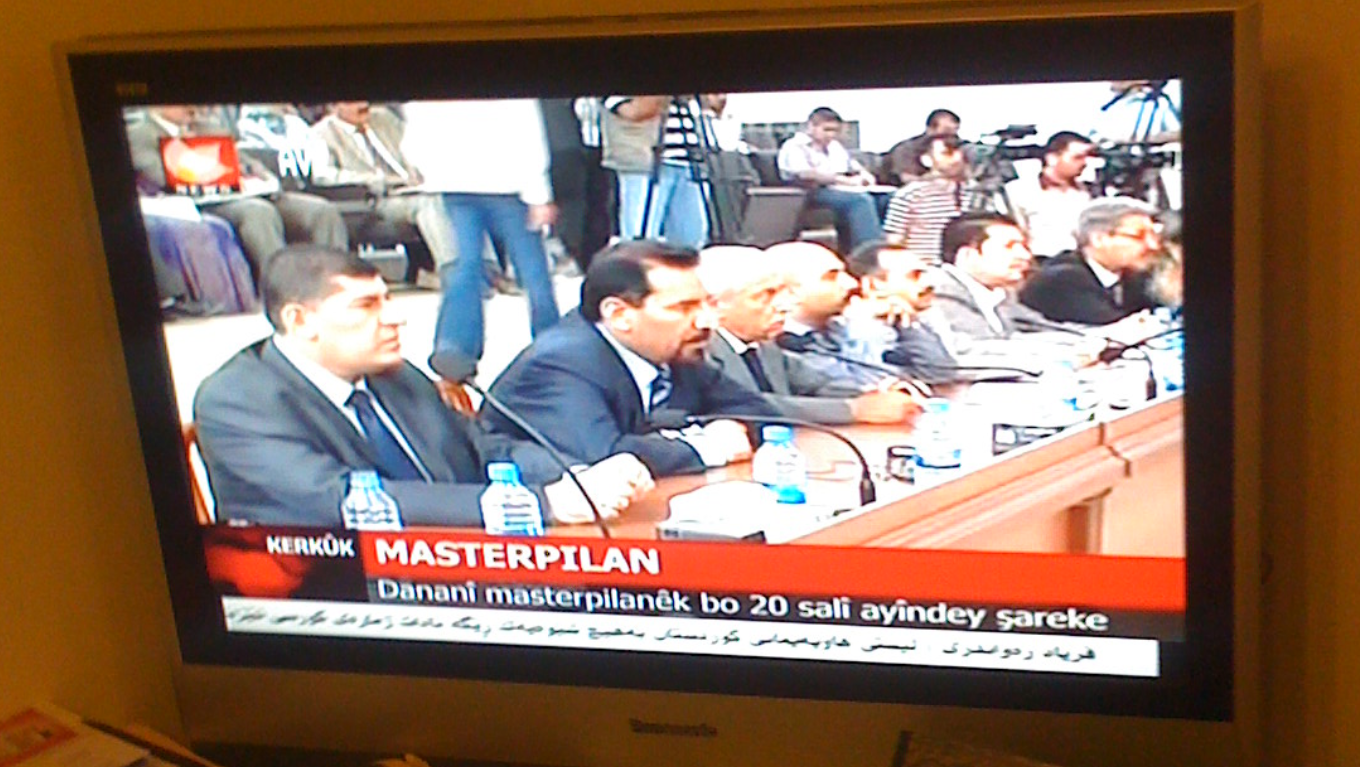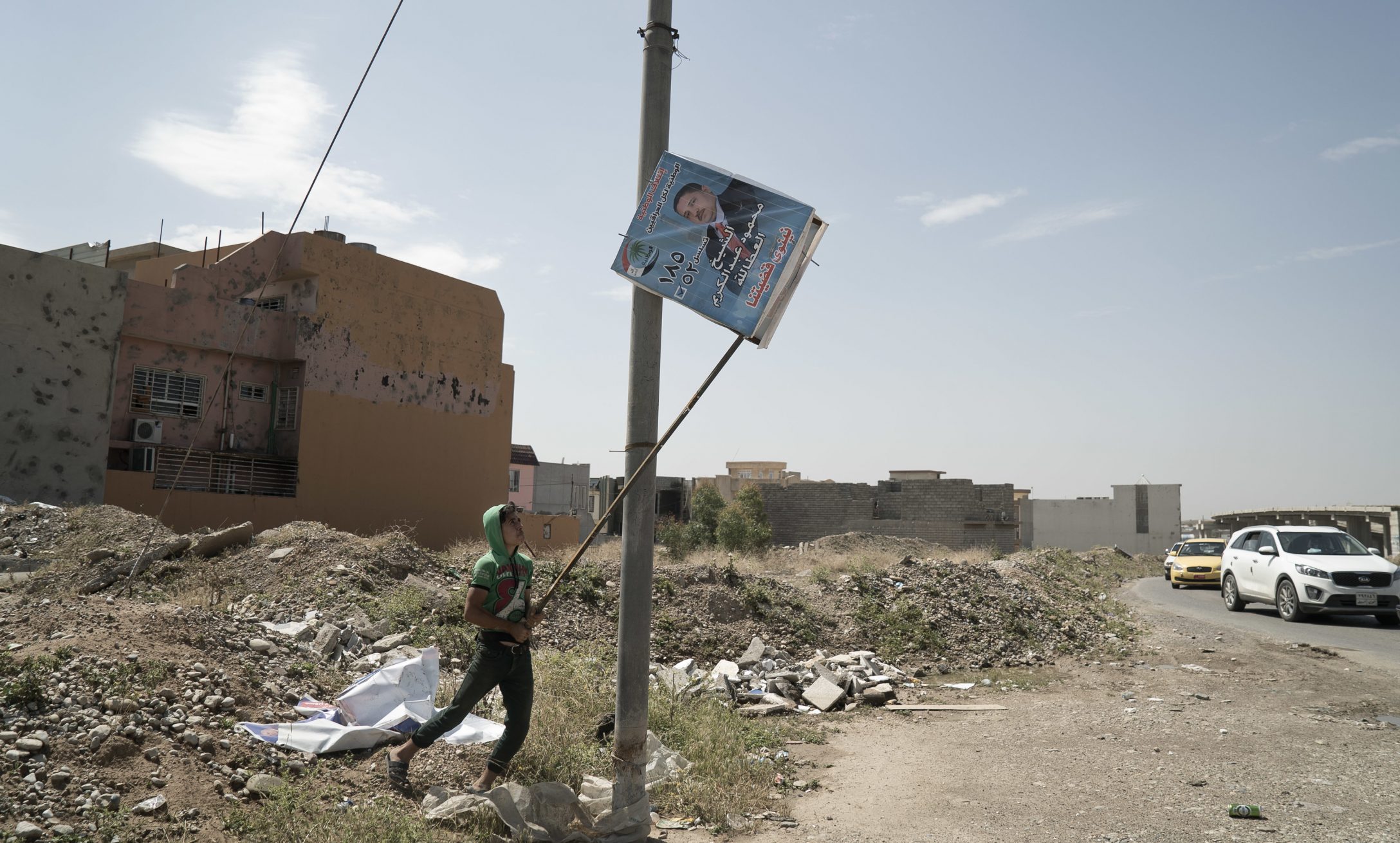Weed out corruption and nepotism! Restore the booja and mooja!
In May, Western media focused on the things that made the Iraqi elections noteworthy: the first election since the recapturing of urban areas from the Islamic State, the lowest turnout since the toppling of Saddam Hussein. But in Iraq the electioneering was the same as ever, and in the Kurdish region, politicians repeated the same old slogans and now-familiar buzzwords about transparency and corruption while calling for the restoration of booja and mooja, crude transliterations of بودجه and موچه (“budget” and “wages”).
When the coupling “booja w mooja” first started cropping up in political debates a few years ago, I was surprised. Kurds often add a second, nonsensical rhyming word in order to belittle the first term; for instance, to say “football w mootball” (where w means “and”) would indicate that football isn’t a worthy endeavor, but something that other people spend too much time fixating on. (This is especially used when technology is discussed: “internet w minternet” or, say, “computer w mumputer.”) I was surprised because belittling the issue of the region’s budget seemed like an oddly tone-deaf move. Family members eventually rolled their eyes at me, explaining that mooja means “wages,” and upon asking local Kurds when this apparent neologism appeared, I was told that it was a word with a long history in Kurdish. I felt like someone was gaslighting me, as I had never heard it used prior to circa 2014. It has no apparent link to neighboring languages; for wages, Farsi uses muajb, the Arabic term for “duty,” while Arabic uses ma’ash, as do Turks and, I always thought, Kurds. A Google search for the word mooja (or, rather, موچه) finds nothing earlier than 2005.
So, where did this mooja come from?
Booja is easy. Le budget entered Kurdish from French through Farsi: the Napoleonic legal code and the French education system were massively influential in Iran prior to the Islamic revolution of 1979, and so, our Indo-European neighbor-language is rife with thousands of French loanwords, from ascenseur to soutien-gorge. Mooja is more of a mystery, with no obvious origin or etymology. But the two words together began to be a cliché in Kurdish politics after a series of events that began in 2014, when Baghdad declared that the Kurdish region would begin receiving a much smaller share of the national budget, down from 17 percent to 12.6 percent.
Since 2003, the Kurdistan region’s budget has been decided by the central government in Baghdad, even though the Kurdistan Regional Government (KRG) has had semiautonomous political control of northern Iraq since 1992 (when the UN instituted a no-fly zone over the area in a bid to get Saddam’s regime to stop their genocidal attacks against the country’s Kurdish population). The relation between the two governments has always been somewhat fraught: the KRG positions themselves as “the Other Iraq” to potential investors while claiming that cities such as Kirkuk are Kurdish and should be governed by the KRG (which Baghdad refuses). When Iraq’s Prime Minister, Haider al-Abadi, slashed the Kurdish portion of the budget, he claimed that the previous figure was based on “an outdated political agreement” that his government would no longer commit to and that the 12.6 percent figure would be more in line with the region’s population. Past agreements have also come under tension because of disagreements over the KRG’s right to export oil directly to Turkey; the central government has asserted that this pipeline voids previous agreements. As a result, Kurdish politicians electioneer on the promise that, if elected, they will push through a better deal for the Kurds.
That’s the booja of it all. And, of course, budget does have a direct connection to wages: as government budgets have been cut, government pay has stagnated or been drastically decreased in recent years, an especially acute problem in a region where a third of the working population is made up of civil servants. Along with the 2014 drop in oil prices, expenditures on a costly war against ISIS, and the cost of millions of refugees and internally displaced people—not to mention a good dollop of corruption—the fact that civil servants, police officers, and teachers receive their salaries months late—if they receive them at all—has plunged the once-prosperous Kurdish region into financial crisis. Widespread strikes and rampant dissatisfaction with the ruling politicians have tweaked the political language, putting the focus not only on the budget, but on the specific application: that people’s wages would be restored. Mooja was added to the booja.
But where did mooja come from in the first place? This is where the difficulties of researching a language like Kurdish become apparent: there’s no OED-style dictionary for the Kurdish language that maps earlier usages, and Google Trends cannot search for terms in non-Latin scripts. The slim but authoritative 1879 Kurdish-French dictionary compiled by Auguste Jaba and Ferdinand Justi does not list the word mooja; instead the word for wages is the same as that in Farsi, muajb. Later well-regarded dictionaries, however, such as Saladin’s English-Kurdish Dictionary from 2000 and the influential Azadi English-Kurdish Dictionary compiled by Rashid Karadaghi in 2006 do translate salary as mooja.
This is a very crude etymology amidst the embers of the Kurdish language, of course; Kurdish is a language, let us not forget, that more than one government has done its utmost to eradicate. But it does seem like mooja is derived from the Arabic word for duty. Beyond phonetic similarities, it makes sense that this new Kurdish form of the word would appear at the end of the twentieth century. For most of that century, as nationalistic fervor was awakened after the First World War, everyone in the region got one of these newfangled nation-states of their own—everyone but the Kurds (and, oh yeah, the Palestinians). So it’s no surprise that Kurds worked painstakingly to remove from their language any influences of our oppressors and rulers: the Turks, the Iranians, and the Arabs. Creating a “pure” Kurdish language free of foreign influences was not always done successfully; some words were too entrenched to be replaced, and sometimes “purification” merely amounted to swapping one imperialist influence for another (as when the Arabic word for actor, mumasil, was replaced by the English actor). But it stands to reason that the Arabic and Persian words for salary were at some point deemed unfit for formal Kurdish. And so, at least in the Sorani dialect spoken in Iraqi Kurdistan, mooja appeared.

Was it expressly coined? Or was it shortened slang that became accepted, official usage? If the mu- prefix links together a cluster of words connected to duty in Arabic, the -ja suffix sounds glaringly un-Arabic to me. More than one person I’ve spoken to seems to recall it being “pati” Kurdish—colloquial, spoken—before it appeared in writing and became part of the formal language of journalists and politicians. Still, the Kurdish language evolves at a rapid pace, and obscure terms become ubiquitous as soon as they become required; for example, masterpilan (you guessed it: “masterplan”) appeared suddenly, without warning, as Kurdish cities needed to rethink their makeshift urban policies. Diaspora Kurds often complain that they have a hard time following the news due to the preponderance of newly coined words, while those who live in the region are steeped in terms that can quickly feel like they have always been there. In the absence of well-trusted lexicographers, the language will remain contested, a Mandela Effect of differing memories.
What is clear, however, is that mooja’s phonetic similarity to booja has something to say about the linkage between the Kurdish budget and the ability to pay people’s wages, about the link between the state and the individual, the public and the private. When the matter of individuals earning a living gets tethered to the Kurdish struggle at large, it’s clearly a cynical ploy, a way for Kurdish politicians to blame all of their internal failings on geopolitical issues outside of their own control (but which they also promise to address). And yet the singsongy rhyming element of the phrase can’t help but comment on this linkage; if the Arabic word for duty has become mooja, the Kurdish phonetic usage makes it seem like wages is a nonsense word and that the budget isn’t worth taking very seriously either. This creates an odd dissonance: the tone of the politicians might be solemn, but the structure of the cliché is comical and dismissive even as the words themselves are repeated so often as to lose their literal meaning entirely. It points to the futility of reform in the Kurdish region, the absurdity of Kurdish aspirations to statehood—and the promises of politicians—while the state is still tethered to and dependent on Baghdad. Not bad for a cliché.
***
Tour of Babel is a regular Popula column, in which we translate the world’s words that can’t be translated, the phrases and expressions that don’t travel (but that also, it turns out, do).






